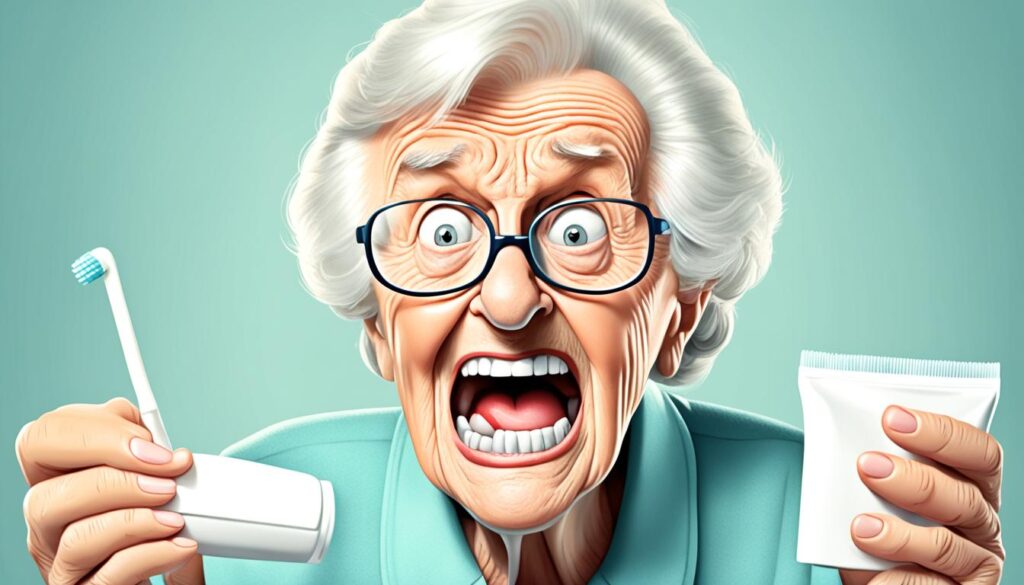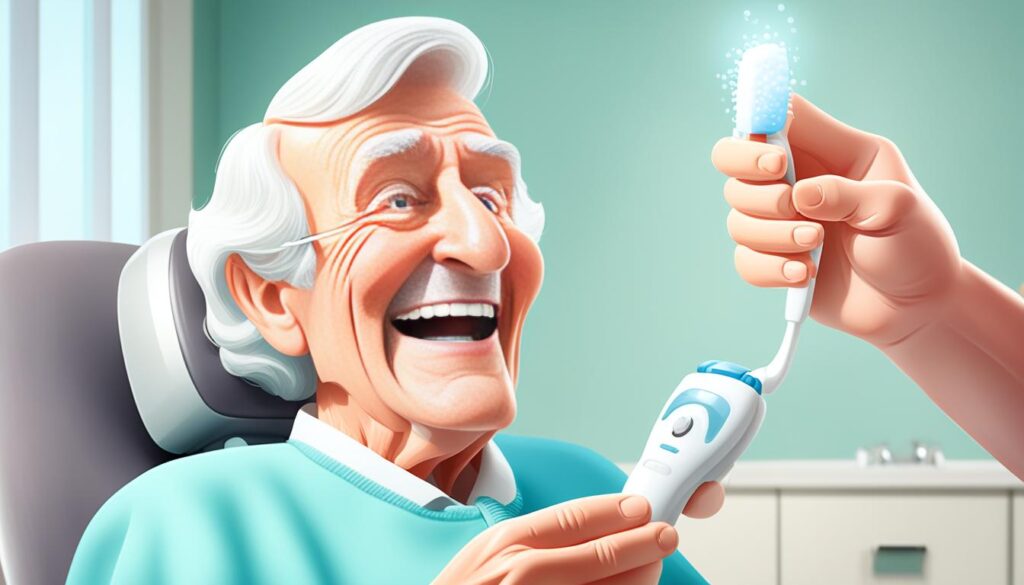Medically reviewed by Dr Chandril Chugh,
Renowned Neurologist and American Trained Specialist
Welcome to our in-depth guide on improving oral hygiene for the elderly with Alzheimer’s disease (AD). Poor oral health is a common issue among individuals with AD, leading to dental caries and periodontal diseases. However, community dental care practitioners can help implement strategies, such as the 5S system, to enhance oral hygiene habits and prevent the need for hospital admission.
Table of Contents
ToggleIn this article, we will explore the challenges faced by individuals with AD in maintaining good oral hygiene and the crucial role that community dental care plays in promoting elderly oral health. We will also introduce the 5S system, originally developed for organizing workspaces, as a powerful tool for effective oral hygiene practice. Additionally, we will discuss the prevalence of dental problems in the elderly with AD and highlight the importance of routine dental care.
Throughout this guide, we will provide tips for implementing the 5S system at home and offer insight into the benefits it brings to oral health. By prioritizing dental care and implementing these strategies, we can significantly improve the oral health and overall well-being of the elderly with AD.
Understanding Dementia and Oral Health
Dementia is a clinical syndrome that encompasses various subtypes, with Alzheimer’s disease (AD) being the most prevalent. For elderly individuals living with dementia, including AD, maintaining good oral hygiene can be a significant challenge. This can result in dental caries and periodontal diseases, which have a profound impact on their overall health and quality of life.
Individuals with dementia often experience cognitive decline, memory loss, and difficulties with daily activities. These impairments can make it challenging for them to perform routine tasks, including proper oral hygiene practices. Neglected oral health can lead to a range of oral diseases, affecting their ability to eat, speak, and maintain overall health.
Table: Impact of Dementia on Oral Health
| Challenges Faced by Individuals with Dementia | Potential Effects on Oral Health |
|---|---|
| Memory loss and cognitive decline | Forgetting to brush teeth or how to perform proper oral hygiene |
| Difficulty with manual dexterity | Inability to manipulate toothbrush or dental floss effectively |
| Changes in taste perception | Reduced interest in eating, leading to poor nutrition and oral health |
| Behavioral changes | Resistance to oral care, agitation, or increased risk of oral trauma |
Addressing the oral health needs of individuals with dementia is crucial to maintain their overall well-being. Implementing strategies and interventions to support their oral hygiene practices can significantly improve their oral health outcomes.
By providing education, assistance, and specialized care, community dental care practitioners can play a vital role in helping individuals with dementia maintain good oral hygiene. They can offer guidance on oral care techniques, recommend adaptive aids, and collaborate with caregivers to ensure consistent oral health practices.
In the next section, we will discuss the specific role of community dental care in improving oral health for the elderly with AD and other forms of dementia.
The Role of Community Dental Care in Elderly Oral Health
Community dental care practitioners play a crucial role in improving oral health and providing primary dental care for the elderly, including those with Alzheimer’s disease (AD). They offer a range of services aimed at promoting good oral hygiene practices and ensuring the overall well-being of this vulnerable population.
Services Provided by Community Dental Care Practitioners
Community dental care practitioners offer comprehensive and personalized oral health assessments for the elderly with AD. These assessments help identify any existing dental issues or potential risks and lay the foundation for effective care planning.
One of the key aspects of community dental care is the provision of support with daily oral care. Dental practitioners work closely with elderly individuals and their caregivers to develop oral hygiene routines that are tailored to their specific needs. This includes guidance on proper brushing and flossing techniques and recommendations for suitable dental care products.
In addition to routine care, community dental care practitioners also play a crucial role in identifying and addressing any specialized dental treatment needs. They work in collaboration with dentists to refer elderly individuals for procedures such as denture adjustments, periodontal treatments, or tooth extractions when necessary.
The Benefits of Community Dental Care for the Elderly with AD
The involvement of community dental care practitioners in the oral health care of the elderly has numerous benefits. Firstly, the regular assessments and care planning ensure that any dental issues are identified and managed promptly, reducing the risk of complications and further oral health deterioration.
Secondly, the support provided by dental practitioners in daily oral care routines helps promote consistency and ensures that proper oral hygiene practices are carried out effectively. This can significantly reduce the occurrence of dental diseases such as dental caries and periodontal disease, improving the overall oral health of the elderly with AD.
Lastly, the collaboration between community dental care practitioners and dentists ensures that elderly individuals receive timely and appropriate specialized dental treatments. This comprehensive approach to oral care helps address any complex dental issues and enhances the overall oral health and quality of life for these individuals.
By incorporating community dental care into the oral health management of the elderly with AD, healthcare professionals can provide holistic and comprehensive care that addresses their unique needs and improves their overall well-being.

| Benefits of Community Dental Care for Elderly with AD |
|---|
| Early identification and management of dental issues |
| Personalized support with daily oral care routines |
| Collaboration with dentists for specialized treatments |
| Improved oral hygiene and reduction in dental diseases |
| Enhanced overall oral health and quality of life |
Challenges of Oral Hygiene for the Elderly with AD
When it comes to maintaining proper oral hygiene practices, elderly individuals with Alzheimer’s disease (AD) face unique challenges. The cognitive impairments associated with AD, such as impaired memory and executive functioning, make it difficult for them to effectively perform daily oral care routines. As a result, these individuals are at an increased risk of developing dental caries and periodontal disease, which can have serious consequences for their overall health.
The impaired memory function in individuals with AD affects their ability to remember to brush their teeth, leading to infrequent brushing and inadequate plaque removal. Furthermore, executive functioning impairment impacts their ability to perform the necessary steps for effective oral hygiene, such as holding a toothbrush properly, applying the right amount of toothpaste, and rinsing thoroughly. These challenges often result in compromised oral health and an increased likelihood of dental problems.
Dental caries, commonly known as tooth decay, can occur when oral hygiene practices are not properly maintained. The accumulation of plaque, a sticky film of bacteria, on the teeth can lead to the production of acids that erode tooth enamel and cause cavities. Similarly, periodontal disease, which affects the gums and supporting structures of the teeth, can arise from inadequate oral hygiene. Inflammation, bleeding gums, and eventual tooth loss can occur if periodontal disease is left untreated.
The consequences of poor oral hygiene for elderly individuals with AD extend beyond dental health issues. The presence of dental caries and periodontal disease can contribute to respiratory infections, including pneumonia, due to the increased likelihood of aspirating oral bacteria. Additionally, untreated oral problems can compromise nutrition and overall well-being, leading to a decline in both physical and cognitive health.
Addressing these challenges is crucial to ensure the oral health and overall well-being of the elderly with AD. By implementing strategies to overcome impaired memory and executive functioning, individuals with AD can maintain better oral hygiene practices and reduce the risk of dental caries and periodontal disease. The next section will introduce the 5S system, an effective approach that can help overcome these challenges and improve oral hygiene outcomes for the elderly with AD.

Introducing the 5S System for Oral Hygiene Practice
The 5S system, originally developed for organizing workspaces, can be adapted for oral hygiene practice among the elderly with AD. By implementing the five steps of 5S – sorting, setting in order, shining, standardizing, and sustaining – you can create a clean and organized environment that promotes effective oral hygiene habits.
The first step, sorting, involves decluttering your oral care items and removing any unnecessary tools. This helps streamline your oral hygiene routine and ensures that you have everything you need easily accessible.
Next is setting in order, where you assign a designated spot for each oral care item. This helps you find what you need quickly and prevents any confusion or time wasted searching for your toothbrush, toothpaste, or floss.
Shining refers to cleaning and maintaining your oral care tools regularly. Ensure that you rinse and dry your toothbrush properly after each use. Regularly clean and sanitize your storage containers for oral care items as well.
The fourth step is standardizing. Create a consistent routine for your oral hygiene practice. This includes brushing your teeth twice a day for two minutes each time, using proper brushing techniques, and flossing daily. Consistency is key to maintaining good oral health.
The final step, sustaining, is about continuously improving and maintaining your oral hygiene habits. Monitor your progress and make adjustments as needed. Regularly assess your oral health with the help of a dental care practitioner to ensure that you’re on the right track.
Implementing the 5S system for oral hygiene practice can greatly benefit the oral health of the elderly with AD. It provides a structured approach to maintaining a clean and organized environment, making it easier for them to maintain effective oral hygiene habits.

The Benefits of 5S for Elderly Oral Health
The use of the 5S system in oral hygiene practice for the elderly with AD offers several benefits. By implementing the 5S system, you can experience improved oral health and reduce the risk of dental diseases such as dental caries and periodontal disease.
Promoting Organization and Cleanliness
By implementing the first two steps of the 5S system, sorting and setting in order, you create a well-organized environment for oral hygiene practice. Putting items where they belong ensures easy access to toothbrushes, toothpaste, and other oral care products, promoting regular and effective oral hygiene habits.
Developing Discipline for Good Oral Hygiene Habits
The 5S system helps foster discipline and routine in oral hygiene practice. By consistently following the remaining steps of shining, standardizing, and sustaining, you establish a structured approach to oral care. This encourages you to adhere to regular brushing, flossing, and mouthwash routines, resulting in better oral health outcomes.
Reducing Time and Effort
With the implementation of the 5S system, oral hygiene practice becomes more efficient. By maintaining a clean and organized environment, you reduce the time and effort required for oral care tasks. This can be particularly beneficial for the elderly with AD, who may experience cognitive impairments that make oral hygiene challenging.
Improving Compliance and Minimizing Dental Diseases
By simplifying the oral hygiene process and optimizing the environment, the 5S system increases compliance with oral care routines. Regular and effective oral hygiene practices significantly reduce the risk of dental diseases such as dental caries (cavities) and periodontal disease (gum disease). This, in turn, contributes to improved overall oral health in the elderly with AD.
Overall, implementing the 5S system in oral hygiene practices for the elderly with AD has numerous benefits. It promotes organization and cleanliness, develops discipline, reduces time and effort, improves compliance, and minimizes the risk of dental diseases. By incorporating the 5S system into daily oral care routines, you can enhance your oral health and overall well-being.

The Prevalence of Dental Problems in Elderly with AD
Elderly individuals with AD (Alzheimer’s disease) are more susceptible to dental problems such as dental caries and periodontal diseases. Several factors contribute to this high prevalence:
- Impaired saliva production: Reduced saliva flow increases the risk of tooth decay and gum disease.
- Medication side effects: Certain medications prescribed for AD can cause dry mouth, leading to oral health issues.
- Behavioral changes: Elderly individuals with AD may exhibit resistance or difficulty in maintaining proper oral hygiene practices.
Addressing these dental problems is crucial for improving the overall health of the elderly with AD. Community dental care practitioners play a vital role in managing and treating these oral health issues. By providing specialized dental care, they can mitigate the impact of dental caries and periodontal diseases on the elderly population.
To illustrate the prevalence of dental problems in the elderly with AD, here is a table detailing their oral health conditions:
| Oral Health Condition | Prevalence |
|---|---|
| Dental caries | ~85% |
| Periodontal disease | ~70% |
As shown in the table, dental caries and periodontal disease are highly prevalent among the elderly with AD, highlighting the urgency to address these dental problems.
The Importance of Routine Dental Care for Elderly with AD
When it comes to maintaining good oral health in elderly individuals with Alzheimer’s disease (AD), routine dental care plays a crucial role. Regular oral health assessments, care planning, and daily oral care support provided by community dental care practitioners can make a significant difference in preventing unnecessary hospital admissions related to dental issues.
As we age, our oral health needs change, and it becomes even more essential to prioritize oral hygiene and dental care. The elderly with AD are particularly vulnerable to oral health problems such as dental caries and periodontal disease. These conditions can cause pain, discomfort, and a decline in overall well-being.
By regularly visiting the dentist and following a comprehensive oral care routine, elderly individuals with AD can significantly improve their oral health. Dental professionals can identify and address oral health issues at an early stage, preventing them from progressing into more severe problems.
Community dental care practitioners understand the unique challenges faced by the elderly with AD and can provide personalized care and support. They can develop customized oral hygiene plans, tailored to the specific needs and abilities of each individual. These plans may include recommendations for specialized oral care products, techniques, and strategies to improve oral hygiene habits.
The provision of routine dental care not only helps maintain good oral health but also contributes to the overall well-being of elderly individuals with AD. Poor oral health has been linked to various systemic conditions, including cardiovascular diseases and respiratory infections. By addressing dental issues promptly and effectively, community dental care practitioners can help reduce the risk of these complications and improve the quality of life for the elderly with AD.
Implementing a regular dental care routine is essential for preventing oral health problems and enhancing the overall health and well-being of elderly individuals with AD. It is important to recognize that routine dental care goes beyond simply brushing and flossing. Regular check-ups, cleanings, and professional advice are vital components for maintaining optimal oral health in this population.
By making routine dental care a priority, we can ensure that elderly individuals with AD receive the necessary support to achieve and maintain good oral health, reducing the risk of dental caries, periodontal disease, and other oral health complications.
| Benefits of Routine Dental Care for Elderly with AD |
|---|
| Maintain good oral health |
| Prevent unnecessary hospital admissions related to dental issues |
| Identify and address oral health issues at an early stage |
| Personalized care and support from dental professionals |
| Reduced risk of systemic conditions linked to poor oral health |
| Improved quality of life |
Tips for Implementing the 5S System at Home
Implementing the 5S system at home can be an effective way to support oral hygiene practice for elderly individuals with Alzheimer’s disease (AD). By following these tips, you can create a clean and organized environment that promotes optimal oral health:
- Sort and organize oral care items: Take inventory of oral care products such as toothbrushes, toothpaste, and mouthwash. Discard expired or unused items and arrange the essentials in a designated area.
- Maintain a clean and clutter-free environment: Keep the bathroom and oral care area tidy and free from unnecessary items. This makes it easier to access oral care products and encourages regular hygiene practices.
- Establish regular hygiene habits: Encourage a consistent oral hygiene routine by setting specific times for brushing and flossing. Use visual cues, such as a daily oral care chart or reminder notes, to help prompt memory and reinforce the habit.
- Monitor and improve sustainability: Regularly evaluate the effectiveness of the 5S system in supporting oral hygiene practice. Make adjustments and improvements based on individual needs and preferences to ensure long-term success.
By implementing these tips, you can create a supportive environment for maintaining oral hygiene practices and reducing the risk of dental diseases in elderly individuals with AD.
Conclusion
Improving oral hygiene is crucial for the overall health and well-being of the elderly, especially those with Alzheimer’s disease (AD). By implementing strategies such as the 5S system and seeking regular dental care, we can effectively prevent dental diseases and enhance the quality of life for these individuals.
Proper oral hygiene practices and routine dental care help in the prevention of dental caries and periodontal diseases, which are common oral health issues faced by elderly individuals with AD. Through community dental care, practitioners can provide essential support in the form of assessments, care planning, and assisting with daily oral care.
By prioritizing oral health, we can ensure better oral hygiene outcomes and overall health for the elderly population. The 5S system, originally developed for organizing workspaces, can be adapted to create a clean and organized environment that promotes effective oral hygiene habits among individuals with AD.
A commitment to improving oral hygiene and dental care for the elderly with AD is essential for preventing unnecessary hospital admissions and reducing the risk of associated health complications. By taking steps to maintain optimal oral health, we can greatly improve the overall well-being of these individuals and contribute to their overall quality of life.
FAQ
How does poor oral hygiene affect elderly individuals with Alzheimer’s disease (AD)?
Poor oral hygiene can lead to dental caries and periodontal diseases in the elderly with AD, which can have a significant impact on their overall health and quality of life.
What role do community dental care practitioners play in improving oral health for the elderly with AD?
Community dental care practitioners provide routine oral health assessments, care planning, and support with daily oral care for the elderly with AD. They can also refer individuals to dentists for specialized treatments.
Why is it difficult for elderly individuals with AD to maintain proper oral hygiene practices?
Elderly individuals with AD often experience impaired memory and executive functioning, making it challenging for them to engage in regular oral hygiene practices.
How can the 5S system help improve oral hygiene practice for the elderly with AD?
The 5S system creates a clean and organized environment that promotes effective oral hygiene habits. By implementing this system, elderly individuals with AD can develop discipline for good oral hygiene practices and reduce the risk of dental diseases.
What are the benefits of using the 5S system for oral hygiene practice in the elderly with AD?
The 5S system helps elderly individuals with AD maintain a clean environment, put items where they belong, and develop discipline for good oral hygiene habits. This system improves compliance and reduces the risk of dental diseases.
Why do elderly individuals with AD have a high prevalence and risk of dental caries and periodontal diseases?
Factors such as impaired saliva production, medication side effects, and behavioral changes increase the susceptibility of elderly individuals with AD to dental problems.
How does routine dental care benefit the oral health of the elderly with AD?
Regular dental care, including oral health assessments and care planning, provided by community dental care practitioners can help prevent unnecessary hospital admissions related to dental issues in the elderly with AD.
What tips can help in implementing the 5S system at home for oral hygiene practice in the elderly with AD?
Sorting and organizing oral care items, maintaining a clean environment, establishing regular hygiene habits, and ensuring sustainability through monitoring and improvement can support oral hygiene practice at home for the elderly with AD.
How does improving oral hygiene impact the overall health and well-being of the elderly with AD?
By prioritizing oral health and implementing strategies like the 5S system, we can prevent dental diseases and enhance the quality of life for the elderly with AD.
